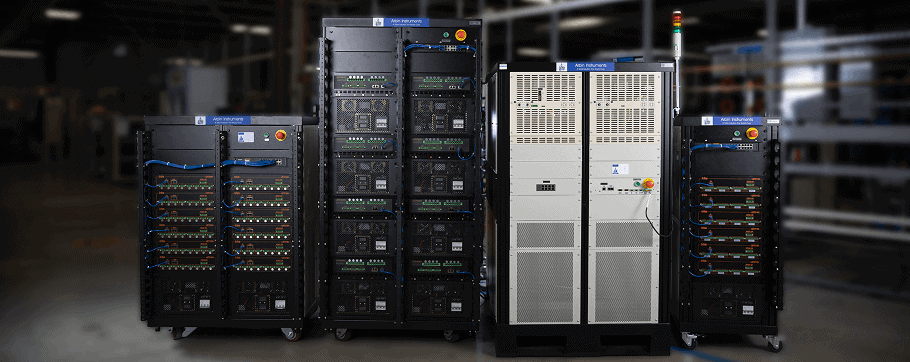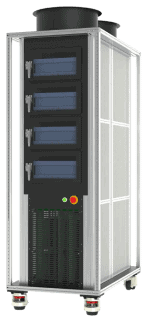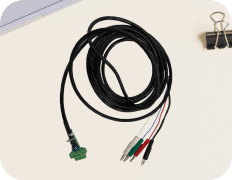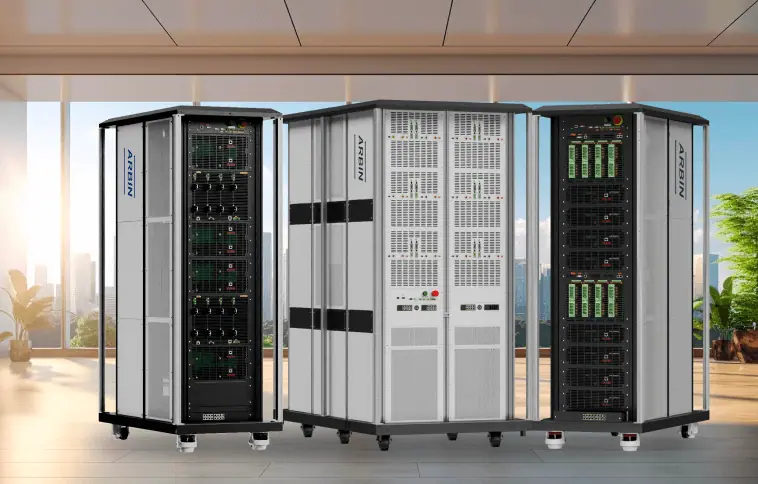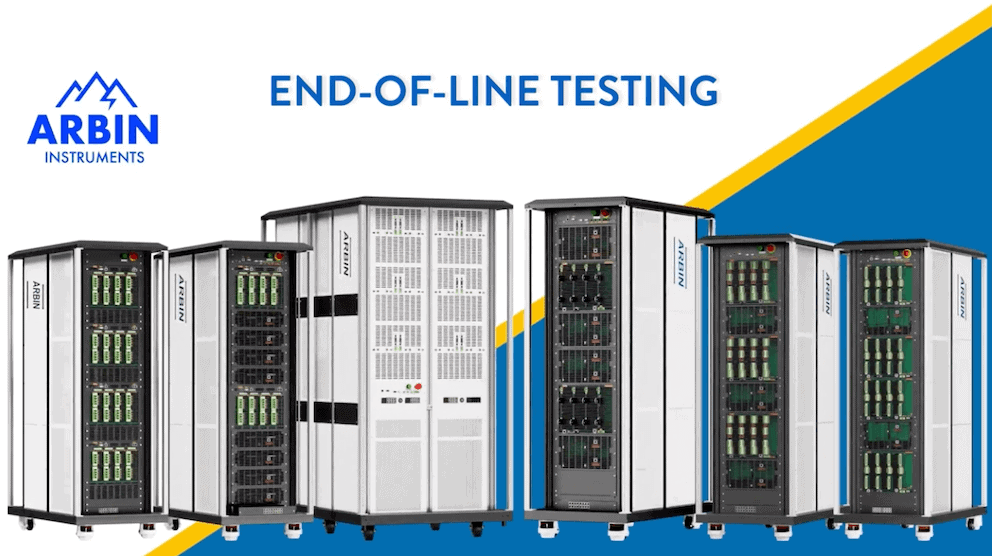기사
배터리 다중 지점 온도 측정
배터리 테스트에서 온도 모니터링의 중요성 정확한 온도 모니터링은 안전과 데이터 무결성을 모두 보장하기 위한 배터리 테스트의 중요한 측면입니다. 테스트 절차 중 열 폭주 또는 과열을 방지하는 것이 한 가지 주요 응용 분야입니다. 배터리가 사전 정의된 온도 임계값을 초과하면 테스트는 [...]를 수행해야 합니다.
NiMH 배터리 완충 상태를 감지하는 방법
전압, 온도 및 델타-V: NiMH 전지의 완전 충전 표시기 니켈-금속 수 소화물(NiMH) 배터리는 양극(음극)으로 수산화 니켈(NiOOH)을, 음극(양극)으로 수소 흡수 합금을 사용하는 충전식 배터리의 한 종류입니다. 니켈 카드뮴(NiCd) 배터리와 비교했을 때 NiMH 배터리는 [...]
전기 자동차(EV)용 배터리 테스트 애플리케이션 노트
목적 및 적용 가능성: 이 애플리케이션 노트는 전기 자동차 (EV)용 배터리의 수명 동작 성능을 평가하기위한 일련의 테스트를 소개합니다.Arbin은 전 세계 전기 자동차 업계 리더와 협력하여 모든 크기의 셀, 모듈 및 팩에 대한 포괄적 인 배터리 테스트 솔루션을 제공합니다.이러한 테스트는 [...]
턴키 배터리 테스트
LBTS-TC: 테스트 채널, 온도 챔버 및 셀 홀더가 통합된 Arbin의 턴키 배터리 테스트 올인원 셀 테스트. 정밀도: 테스트 채널당 4개의 전류 범위에서 업계 최고의 24비트 분해능으로 100ppm 측정 턴키 솔루션, 채널과 온도 케이블이 완전히 통합되어 채널에서 MZTC 동적 온도 설정점 관리 [...]로 도착합니다.
Honeywell과 Arbin Instruments가 협력하여 대규모 리튬 이온 배터리 제조에 혁명을 일으키다
하니웰은 오늘 아빈 인스트루먼트와 협력하여 첨단 자율 형성 시스템을 통합함으로써 리튬 이온 배터리 제조업체 및 기가팩토리를 위한 배터리 제조 우수성 플랫폼(MXP)을 강화했습니다.
Ambri 회사는 차세대 개발 연구소 확장을 위해 Arbin Instruments의 배터리 테스트 장비 선택
배터리 테스트 계측 분야의 선두주자인 Arbin Instruments가 앰브리의 파일럿 제조 확장을 위한 고전류 배터리 테스트 시스템 공급업체로 선정되었습니다. 이 시스템은 혁신적인 Liquid Metal™ 배터리의 개발과 상용화를 촉진할 것입니다. 앰브리의 차세대 배터리는 다양한 [...]을 위한 장시간 고정식 에너지 저장을 제공합니다.
갑작스러운 연결 끊김 등 이벤트 중 BMS 손상 방지
특히 두 가지 기능을 함께 적용하면 테스트 도중 갑작스러운 배터리 분리로 인한 위험을 최소화할 수 있습니다.
유럽의 전기 확장: 기가팩토리의 부상과 Arbin의 대응
배터리 산업을 발전시키는 사람들을 지원한다는 목표의 일환으로 Arbin Instruments는 유럽에서 배터리 개발에 전념하고 있습니다. Arbin은 대규모 운영을 위한 사이클러 및 데이터 관리 솔루션과 성장하는 Arbin 유럽 전담팀이라는 두 가지 주요 방식으로 배터리 연구 및 생산에 대한 증가하는 수요를 해결하기 위해 노력하고 있습니다.
Arbin CAN: Arbin의 CAN 버스 기능을 통한 BMS-테스터 통신
Arbin의 Mits Pro는 CAN 버스 프로토콜을 사용하여 배터리 테스트 장비와 배터리 관리 시스템 간에 CAN 메시지를 주고받을 수 있으며, Arbin 테스터를 외부에서 제어할 수 있습니다.
배터리 산업과 함께 미래로 확장하기: 2022년을 내다보는 Arbin
2021년 창립 30주년을 맞이한 Arbin은 이제 2022년을 준비하며 마주하는 모든 도전에 맞서기 위한 사명을 이어갈 것입니다. Arbin은 배터리 기술의 최전선에 서서 연구를 촉진하기 위해 최첨단 배터리 테스트 장비를 제공하기 위해 최선을 다하고 있습니다. 배터리 산업은 [...] 성장했습니다.
배터리 기술의 미래
배터리 기술은 다양한 재료, 구성 및 디자인에 대한 연구와 개발이 새로운 통찰력과 혁신을 가져옴에 따라 끊임없이 진화하고 있습니다. 전 세계가 친환경 에너지로 나아가고 있는 가운데, Arbin의 배터리 테스트 장비는 미래의 배터리 요구 사항을 혁신하는 데 도움이 되도록 설계되었습니다.
온도가 배터리 테스트에 미치는 영향
온도는 배터리 성능에 큰 영향을 미치므로 배터리 테스트 시 고려해야 할 중요한 요소입니다. 온도가 배터리 성능에 영향을 미치는 다양한 방법, 배터리 테스트 시 고려해야 할 온도, 그리고 이러한 문제를 해결하는 데 아빈 인스트루먼트가 어떻게 도움을 줄 수 있는지 알아보세요.
배터리 쇼에서 아빈 인스트루먼트
아빈 인스트루먼트는 최근 배터리 산업의 혁신에 초점을 맞춘 중요한 행사인 2021 배터리 쇼에 참석할 수 있는 특권을 누렸습니다. 이 행사에서 얻은 경험과 올해 전시회 현장에서의 하이라이트에 대해 자세히 공유하고자 합니다.
중앙 서버에서 배터리 테스트 시스템 제어의 세 가지 이점
중앙 집중식 배터리 테스트 관리는 배터리 테스트 연구소에 여러 가지 이점을 제공합니다. 중앙 집중식 제어는 장비 및 테스트 관리를 간소화하여 실험실과 연구원이 보다 생산적이고 효율적인 테스트를 수행할 수 있도록 지원합니다.
중앙 모니터 및 제어 솔루션(CMCS)으로 Arbin 시스템 관리하기
Arbin의 CMCS는 연결된 PC에서 여러 사이클러의 테스트와 테스트 상태를 감독할 수 있어 배터리 테스트 장비 관리를 간소화합니다. 또한 사용자 액세스 수준, 테스터 상태 알림, 타사 데이터 분석 도구와의 통합도 가능합니다.
아빈 인스트루먼트, 인도 푸네에 사무소 설립
고정밀 배터리 테스트 장비 제조업체인 아빈 인스트루먼트는 인도 푸네에 인도 지사를 개설했다고 발표했습니다.
실험실에 배터리 랙 연결 시스템이 필요한 5가지 이유
잘 계획된 배터리 랙 연결 시스템을 통해 연구자들은 실험실의 안전과 효율성을 최적화하기 위해 테스트 장비를 설정하고 구성할 수 있습니다. 배터리 랙이 유용한 5가지 주요 방법을 소개합니다.
Arbin의 시스템이 실제 배터리 시뮬레이션을 지원하는 방법
배터리 테스트의 실제 시뮬레이션은 실제 배터리 성능을 보다 정확하게 예측할 수 있습니다. Arbin의 RBT 시리즈 기능이 어떻게 동적 테스트 프로파일을 지원하여 연구자에게 보다 신뢰할 수 있는 배터리 성능 결과를 제공하는지 알아보세요.
배터리 및 웨어러블 의료 기술
의료 기술의 혁신은 예방 의학 및 만성 질환 관리를 개선하는 데 큰 역할을 합니다. 아빈의 배터리 테스트 장비가 의료 기술의 발전을 어떻게 지원하는지 알아보세요.
3 산업용 배터리의 업계 최고의 응용
"질량이 없는" 배터리가 있다는 것은 무엇을 의미하며, 이러한 유형의 배터리에 적용할 수 있는 애플리케이션에는 어떤 것이 있을까요? Arbin이 구조적 배터리 개발을 어떻게 지원하는지 알아보세요.

